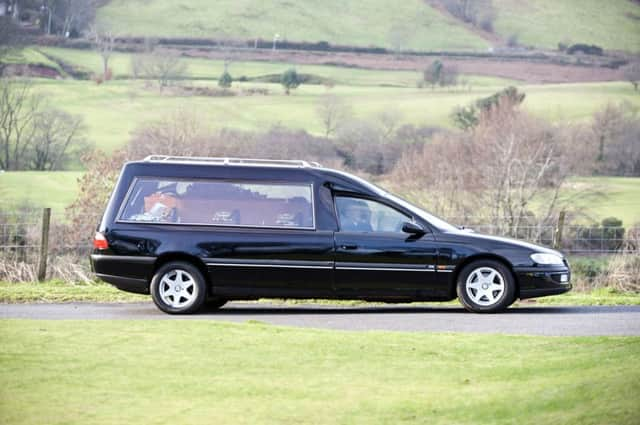Funeral debt on the rise for grieving families


Meanwhile, total spending on funerals in the UK is to increase to £3.7 billion by 2020, up from £2.8bn in 2014.
In its report The Funeral Time Bomb, to be published on Monday, the International Longevity Centre UK (ILC-UK) has predicted that average funeral costs could reach £7,000 by 2020, with the cost of a simple funeral projected to rise to £5,226. The average cost of a simple funeral in 2014 was £3,590.
Advertisement
Hide AdAdvertisement
Hide AdDemographic think-tank ILC-UK said that a rising number of deaths in Britain was putting pressure on existing funeral services, and pushing up costs such as burial fees and the price of hiring a funeral director.
It called for more government help for families unable to afford a funeral, as well as for more people to put plans in place for their own send-off in advance of their death.
The cost of a funeral has already risen by 80 per cent since 2004, the report found, leaving hundreds of thousands of people with debts for the cost of burying a family member. In 2013, an estimated 109,000 UK adults incurred funeral debt, with the average standing at £1,305 a person.
Baroness Sally Greengross, chief executive of ILC-UK, which carried out the report on behalf of mutual OneFamily, said: “More than half of UK households have less than £3,000 in savings and many will struggle to cover funeral costs.
“We all need to talk more about dying and ensure we are prepared for the inevitable. State support for funerals is complex and inadequate.”
More than one in four of those who have arranged a funeral in the past five years had to do so without financial provision made by the deceased, leaving them to cover the cost with savings or loans.
Meanwhile, government funeral payments to help low-income families have not kept up with the 80 per cent rise in the cost of a basic funeral since 2004, growing by just 36 per cent over the same period. The average amount awarded in 2012 represented just 37 per cent of the costs of a basic funeral.
“Payments should be reviewed each year to ensure they accurately reflect funeral costs,” the report said. “Eligibility criteria need to be simplified and given the sharp rise in funeral costs, the government should consider making funeral payments available for a larger number of families.”
Advertisement
Hide AdAdvertisement
Hide AdCitizens Advice Scotland last year reported that funeral costs had risen by 7 per cent a year over the decade from 2004.
It discovered that the most expensive Scottish local authority for burials, East Dunbartonshire, charged four times as much at £2,716 as one of the cheapest, East Renfrewshire, just seven miles away, where people pay out an average of £715.
Fraser Sutherland, consumer spokesman for Citizens Advice Scotland, said: “People who have never organised a funeral are often shocked at how expensive it is. There are lots of different expenses, which all add up.
“There are charges for the grave site as well as fees to the undertakers, the cost of the coffin, then flowers etc.
“These high costs come at a time when many are struggling just to feed themselves and keep their homes, so a sudden bill of more than £3,000 can be devastating.”
FOLLOW US
SCOTSMAN TABLET AND MOBILE APPS